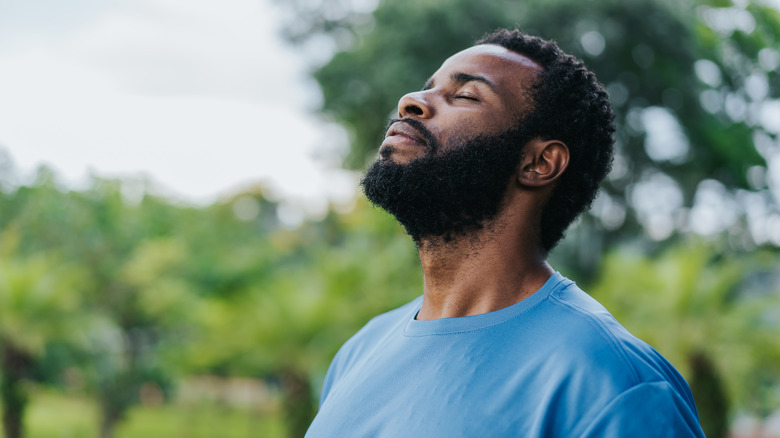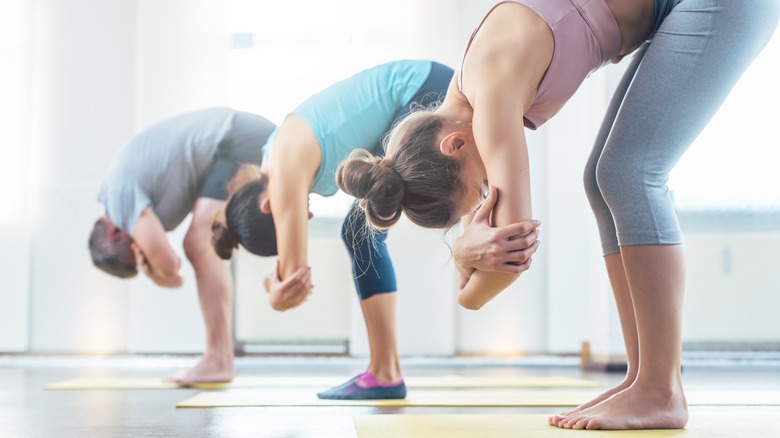Strengthen Your Lungs With One Easy Exercise
You probably take breathing for granted because it's something most people don't think about. Yet your breathing is critical to life. While you inhale oxygen deep into your lungs, it passes into your bloodstream, nourishing your cells. During your exhale, the byproduct of your cells' energy production, carbon dioxide, leaves your body (per National Heart, Lung, and Blood Institute). This oxygen-carbon dioxide exchange occurs between 12 to 20 times every minute.
You probably find your breathing quickens when you're exercising hard. When you're stressed, you might notice not only a faster rate of breathing but also that your breathing becomes shallow. Shallow breathing can be caused by stress, poor posture, and inactivity. While shallow breaths can also be the result of serious medical conditions like COPD, you might also notice you either hold your breath or take shallow breaths when you check your email, according to Calm.
Practicing different ways of breathing can deepen your breath and expand your lung capacity, according to The Healthy. One way to do this is to practice emptying your lungs completely as you bend from your waist.
Practicing full breaths
This exercise lets you stretch your lungs and your body. Begin standing with a slight bend at your knees and arms at your sides. Take an average inhale, then exhale all the air from your lungs while bending at the waist. Then inhale as you stand up again, raising your arms overhead for a stretch. Hold the inhale for 20 seconds, then exhale again as you bend over. Repeat this exercise three more times (per The Healthy).
According to the American Lung Association, you can also strengthen your lungs through diaphragmatic breathing. Diaphragmatic breathing trains your body to recruit your diaphragm rather than your chest to breathe. While sitting down or lying on your back, place your hands on your belly. Breathe in through the nose with your mouth closed, feeling the belly expand as the diaphragm pushes the organs out. On the exhale, purse your lips like you're blowing bubbles. Continue concentrating on deepening the breath for about five to 10 minutes, focusing on the belly expanding and contracting like a balloon.
This type of breathing also teaches you how to slow your breathing down and get in more oxygen, especially when you feel short of breath. Diaphragmatic breathing also requires less energy to breathe and helps induce calm.
The importance of lung health
Strengthening your lungs is particularly important as you age because you begin to lose lung capacity, according to Healthline. Shallow breathing doesn't allow your lungs to expand to their fullest capacity. Over time, your breathing becomes less efficient, and you might not be getting enough oxygen into your body. Taking shallow breaths could also signal more muscle tension, stress your immune system, and disturb your ability to sleep (per Calm).
It shouldn't be a surprise that exercise also helps to strengthen your lungs. As your heart beats faster and your body breathes harder to meet your body's increased needs for oxygen, your body improves its ability to transport oxygen to your cells to make energy (per American Lung Association).
Pollutants in the air in your home — such as scented air fresheners, mold, and dust — can affect your lungs, so consider an air filter to improve your breathing at home. Smoking can affect your lung health, but so can being around people who smoke. A diet rich in fiber and antioxidants keeps your body and lungs healthy (per Healthline).



